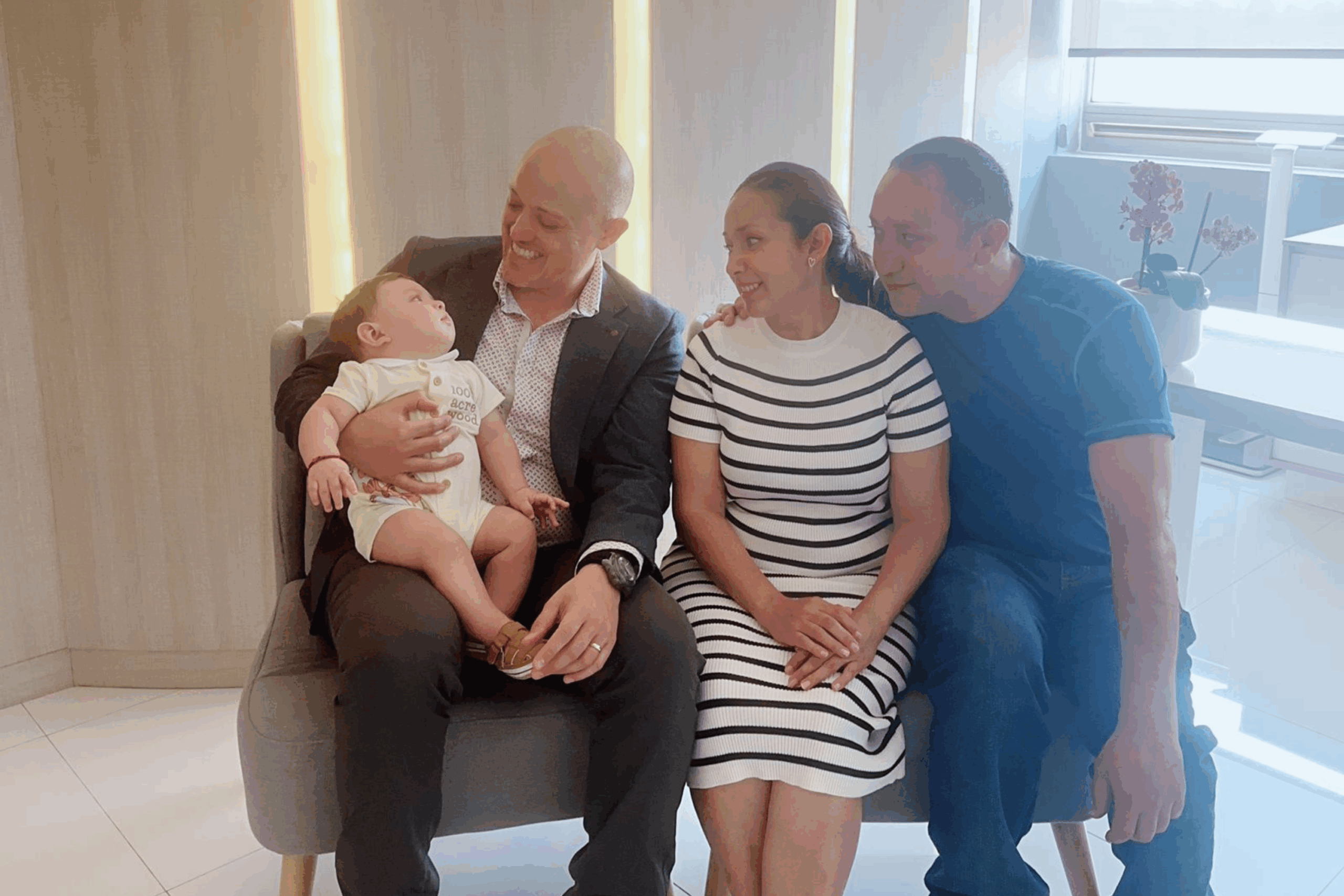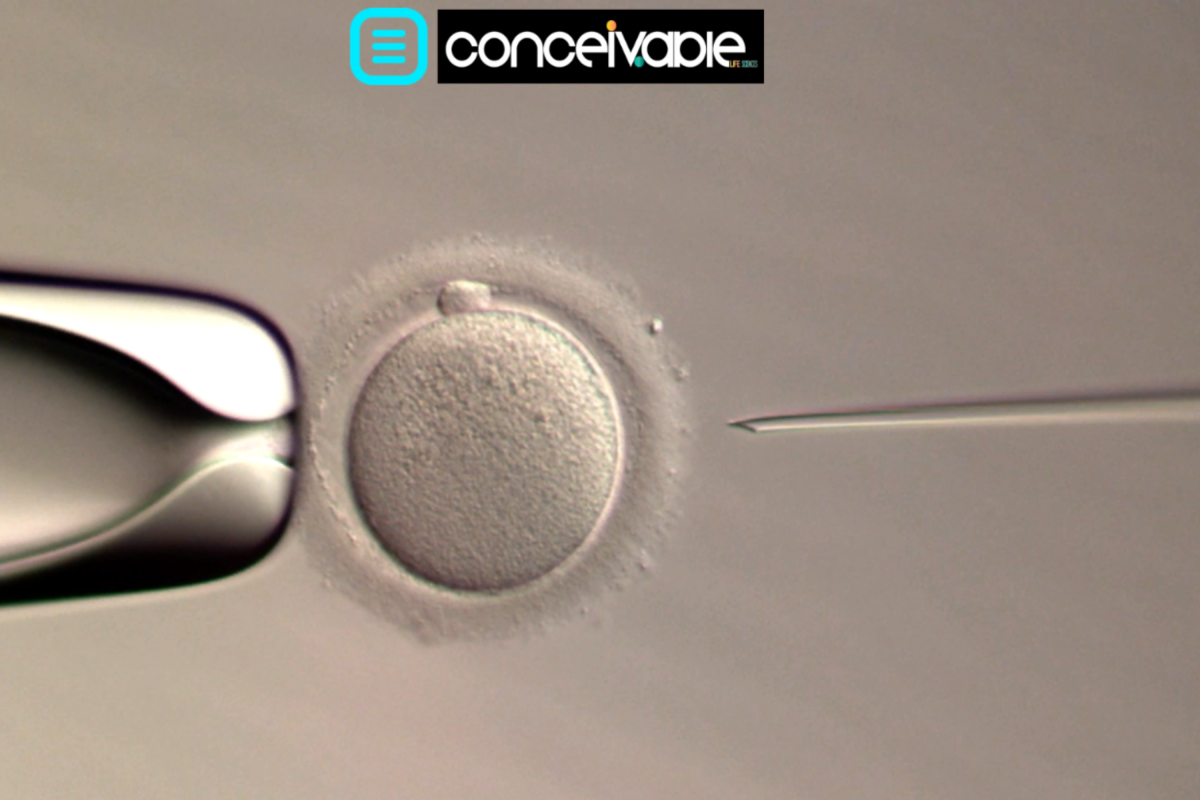
The parents of the world’s first baby born thanks to AI exclusively told Newsweek how a new IVF procedure powered entirely by artificial intelligence made the “impossible” a reality.
The couple’s hopes of starting a family were crushed when Edna, 42, and Tony, 45, were diagnosed with infertility issues, including Edna’s ovarian insufficiency.
But in 2023, they were introduced to a prototype study led by Conceivable Life Sciences through Hope IVF—a private clinic in Mexico City.
Conceivable
The precision of AI
This study proved it was possible to control robotics within the IVF lab to perform ICSI, otherwise known as Intracytoplasmic Sperm Injection, remotely to create an embryo.
This means embryos created through the robotic ICSI step receive consistent treatment with high precision and a more controlled approach to combining the egg and sperm, compared to current manual methods.
The surgeon still oversees the robot and the processes, but with much improved outcomes.
Edna and Tony—who are using their middle names for privacy—spoke exclusively to Newsweek about how they became the first family shaped by AI.
“We represent expectations and hope for all those couples who are unable to reach their goal to become parents,” they said through Spanish translation. “Once we heard the baby’s heartbeat, we felt like we reached something that seemed previously impossible.”
A scalable model for fertility treatment
The prototype study involved 41 patients and to date, has resulted in 21 pregnancies and 18 live births.
Its system sees AI-powered robots help human doctors in a first step towards automating IVF treatments. The remote ICSI procedure used allows for a much gentler approach to embryo creation, helping improve quality outcomes at a microscopic level.
Baby Luis (his real name) was born in Morelia in November 2024. Now seven-months-old, he has become the first baby to be conceived thanks to AI.
Inside the AI system
Chief medical officer at Conceivable Life Sciences, Dr. Alejandro Chavez-Badiola and one of the principal investigators on the paper, shared two scenarios: “Am I the lucky patient who is going to be treated by the best embryologist in the world at 8 a.m. after a cup of coffee and with a smile on their face, fully focused,” he told Newsweek.
“Or am I going to be the unlucky patient who is going to be treated by the best embryologist in the world at 1 p.m. when they’re about to inject their 17th egg, thinking about lunch and having just received a distressing phone call from their partner.”
With this new system, the entire procedure uses mathematical algorithms and robotics to carry out the fertilization process step-by-step, with future precision likely to be beyond human capability.
“Automation is not only allowing us to standardize these issues with the precision of robots, but to scale this [and] to make sure that every patient anywhere in the world, at any given time, can be treated by the best embryologists,” Dr. Chavez-Badiola said.

Conceivable
Tony told Newsweek that the couple didn’t have concerns about using the technology to finally become parents.
“Although it can be directed to other purposes like weapons or other negative aspects, I feel like it should be applied on a daily basis, because well done, its purpose will be at the service of mankind,” he said.
While there will always be a clinical team overseeing the automated lab, remote control enables global teams to manage automated labs beyond regular hours, allowing for 18–20-hour workdays. Additionally, as the system can be operated remotely, a specialist in one country can carry out fertilization procedures for patients in another.
Cost and duration were also differing factors from traditional methods, but the couple put their trust in the team at Conceivable.
“By being more optimal and efficient, I feel like it will reduce the amount of attempts and the necessity of medications,” Edna told Newsweek.
Edna said that the process was fraught with emotion, given the negative outcomes of their previous IVF rounds.
Edna was working in another city when she took the pregnancy test. “When I told Tony the news I was pregnant, it was a delightful surprise for him,” she told Newsweek. “We were very happy.”

Conceivable
The success rate of 51 percent aligns with industry standards, according to the Vienna Consensus.
However, in their trials, the researchers also found that embryos created using this AI system had an as good—if not better—development potential than those made by humans alone, resulting in high-quality blastocysts—the stage at which embryos are typically relocated from an embryo transfer catheter to the uterus.
Edna and Tony’s clinician Dr. Luis Miguel Campos told Newsweek that once he had explained the process of ICSI to them, they saw it as an opportunity.
“I joined this program to help two beautiful humans achieve their goal…and when they heard they were pregnant, I cried like never before,” he said.
As for next steps at Conceivable, Dr. Campos said consistency in outcomes is a top priority, eventually leading to an improvement in access for any patient around the world.
“By [producing] consistency in results, the control process will imply reducing costs and be more efficient,” he said.
Ethics and AI
Dr. Alexander Kotlyar, a reproductive endocrinologist and infertility specialist at Genesis Fertility, told Newsweek emerging AI tools in fertility can enhance core ethical principles, provided they are carefully assessed and properly trained.
“The ethical debate around AI reminds me of the long-standing tug-of-war behind genetic testing of embryos,” he said. “In both cases, there is concern about how the use of new technology, like DNA testing techniques, can truly benefit patient outcomes, [for example], getting pregnant and having a live birth.”
Dr. Kotlyar explained the use of AI in the fertility field has grown significantly since the first “test tube” baby was born over forty years ago. This development can be partly attributed to the fact that the processes behind AI algorithms are often not transparent, which raises questions about their outcomes and reliability.
“This concern is even more profound with AI since decision-making is, at least partly, given to a machine,” he told Newsweek. “However, I would reassure patients and the public that in both cases, the technology is always tested against the principles of core medical ethics and if we cannot stay true to those principles, then we do not use the technology.”
Hope for future parents
For Edna and Tony, being the first successful participants of the prototype clinical trial is a dream come true.
“We were fortunate to be selected over other candidates for this first treatment, and we feel blessed,” they told Newsweek. “We encourage all those couples who are on the journey to becoming parents to not abandon their dreams and hopes.”
The couple received strong support from both sides of their families. “Some of them felt a little concerned but in the end, everyone was really happy for our outcome,” Tony said.
When he’s old enough, both Edna and Tony will happily tell Luis that he was conceived using AI. “There’s a lot of ignorance and certain concerns about technology, but we will explain gladly to our son.”
Do you have a tip on a health story that Newsweek should be covering? Do you have a question about IVF? Let us know via health@newsweek.com.
Reference
Mendizabal-Ruiz, G., Chavez-Badiola, A., Hernández-Morales, E., Valencia-Murillo, R., Ocegueda-Hernández, V., Costa-Borges, N., Mestres, E., Acacio, M., Matia-Algué, Q., Farías, A. F.-S., Carreon, D. S. M., Barragan, C., Silvestri, G., Martinez-Alvarado, A., Olmedo, L. M. C., Aguilar, A. V., Sánchez-González, D. J., Murray, A., Alikani, M., & Cohen, J. (2025). A digitally controlled, remotely operated ICSI system: Case report of the first live birth. Reproductive BioMedicine Online, 50(5). https://doi.org/10.1016/j.rbmo.2025.104943
